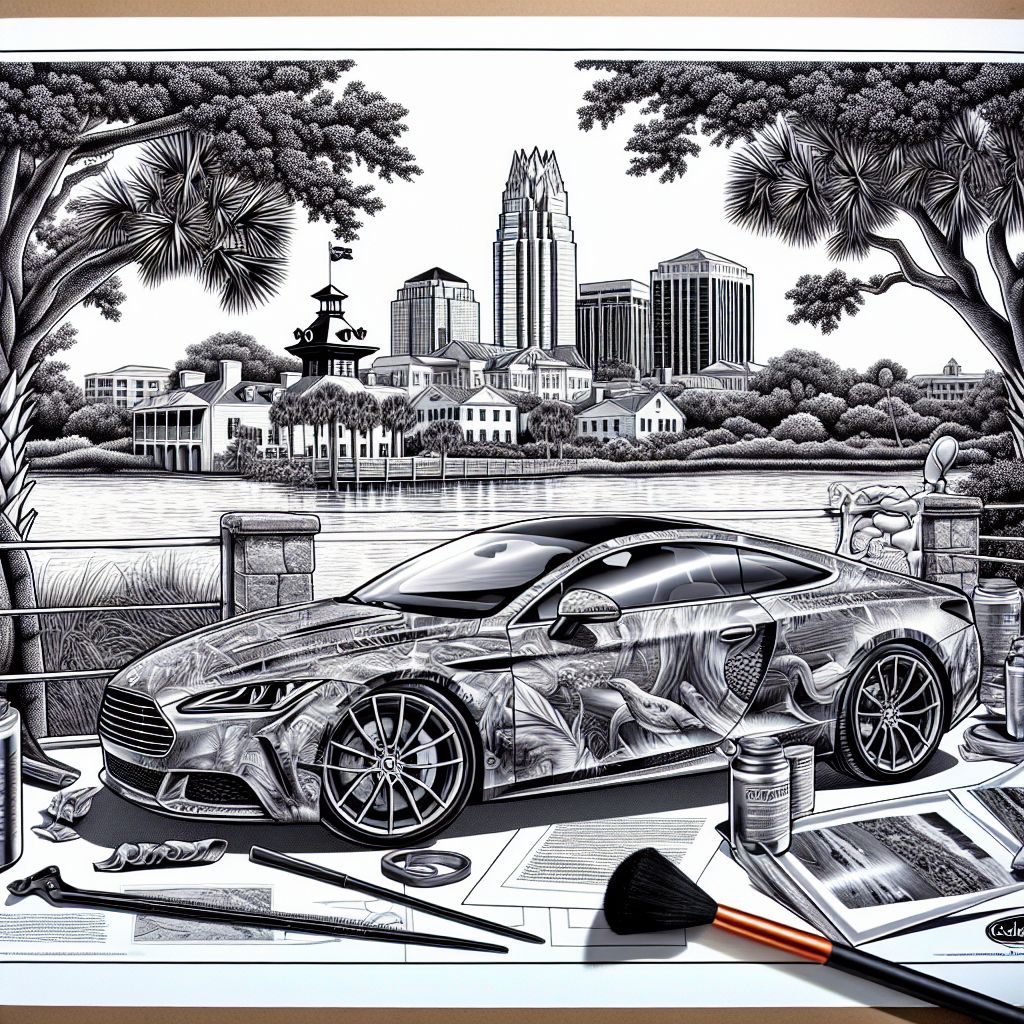
Key Takeaways
- In South Carolina, certain car wrap changes require DMV notification, especially significant color changes.
- It’s essential to inform your insurance provider about your car wrap to ensure proper coverage and claim validity.
- License plate wraps are not permissible, as they can obscure critical information and are therefore illegal.
- When choosing a car wrap, consider both state regulations and local law enforcement practices.
- Maintaining your car wrap properly will extend its lifespan and preserve its appearance.
Hitting the Road in Style: Legal Wraps in South Carolina
So you’re thinking about giving your ride a fresh new look with a car wrap? It’s a fantastic way to express your style or advertise your business, but before you jump in, there are a few things you need to know about the rules in South Carolina. Let’s make sure your vehicle not only turns heads but also ticks all the legal boxes.
South Carolina Car Wrap Basics
First off, car wraps are a popular choice for personalizing vehicles, but they come with a set of guidelines. These rules are in place to ensure safety and compliance with state laws. In South Carolina, as in many states, the Department of Motor Vehicles (DMV) has specific requirements regarding vehicle appearance and modifications.
One of the most important things to keep in mind is that any significant change to your vehicle’s appearance, especially its color, may need to be reported. This is because your vehicle’s registration details include its color, which is a key identifier in various situations, such as traffic stops or vehicle recovery after theft.
Understanding the Legal Landscape of Vehicle Customization
Vehicle customization, including wraps, is governed by state laws, which can differ significantly from one place to another. In South Carolina, the legal landscape centers around visibility, reflectivity, and identification. The aim is to ensure that vehicle wraps don’t interfere with the driver’s visibility or the vehicle’s recognizability.
Because these rules can be nuanced, I’ll guide you through what you need to consider to stay on the right side of the law.
DMV Notifications: Keeping It Legal
When you apply a car wrap, it’s not just about choosing the coolest design. You’ve got to keep it legal, too. Here’s the scoop on when and how you need to notify the DMV about your new vehicle wrap.
When and How to Notify the DMV
If your car wrap significantly changes the color of your vehicle, you’ll need to let the DMV know. Why? Because your car’s color is a crucial detail on your registration. If your car is, say, registered as blue, but your wrap makes it look red, that’s a significant change. Here’s what to do:
- Head to the DMV’s website or give them a call to find out the process for updating your vehicle information.
- Fill out any necessary forms and, if required, pay a fee to update your vehicle’s registration details.
- Do this promptly after your wrap is complete to avoid any legal headaches down the road.
Color Change: What Qualifies as a Notification Requirement
A color change doesn’t mean a slight shade difference. We’re talking about a change that makes your car look like a different color altogether. If you’re going from light blue to navy, you’re likely fine. But if you’re switching from white to black, you’ll need to notify the DMV.
License Plate Wraps and Legality
Here’s a quick note on license plates: wrapping them is a no-go. Your license plate’s job is to be clear and readable from a distance. Any wrap that covers or changes how your plate looks is not only illegal but can also land you with a hefty fine. Keep it unwrapped and stay out of trouble.
Now that you’ve got a handle on the basics, let’s dive deeper into the details of car wrap rules in South Carolina. Stay tuned for more tips and tricks to keep your vehicle looking sharp and staying street-legal.
South Carolina Car Wrap Guide: DMV & Insurance Notification Rules
| Aspect | DMV Notification Required | Insurance Notification Required | Reference |
|---|---|---|---|
| Color Change via Wrap | No | Yes | [Signs101] |
| Reflective or Tinted Wraps | Not specified | Not specified | |
| Visibility of Original Color | Not required (if asked, explain it’s a removable coating) | Not specified | [Reddit] |
| Impact on Insurance Rates | Not applicable | Probably not, but declaration is necessary | [Reddit] |
| Legal Considerations | Must ensure visibility and legibility of license plates | Must declare to avoid invalidation of insurance | [Buy Radar Detectors] |
References:
Signs101 – Wrapped Vehicles: Do We Need to Report a Color Change to DMV?
Reddit – Car Wraps: Do I Have to Tell the DMV or Insurance?
Buy Radar Detectors – State License Plate Laws
Custom Wrap Design: What’s Allowed?
Example: In South Carolina, a business might choose a car wrap featuring their bright logo and contact details. This is perfectly legal as long as it doesn’t cover the windows, impede the driver’s vision, or include any offensive imagery.
When it comes to custom car wraps, your imagination can run wild with the colors and patterns you choose. However, there are some limitations to keep in mind. The design should not obstruct the driver’s view or include any graphics that mimic official vehicles like police cars. Also, steer clear of any imagery that could be considered offensive or distracting to other drivers.
It’s also wise to avoid designs that cover your vehicle identification number (VIN) or any other identifying marks. These are essential for legal and identification purposes. In the event of an accident or theft, these identifiers are crucial for law enforcement and insurance companies.
Remember, while your car wrap is a reflection of your personality or brand, it’s also subject to public decency laws and road safety regulations. Make sure your design fits within these parameters to avoid any legal issues.
Legal Considerations for Car Wrap Designs
Before you decide on that flashy wrap design, take a moment to consider the legal side of things. In South Carolina, your car wrap design must not infringe on DMV regulations or insurance notification requirements.
- Impair the driver’s ability to see out of the windows (this includes the use of dark tints on the windows).
- Include graphics that could be mistaken for an emergency or law enforcement vehicle.
- Feature offensive language or images that could be considered a public nuisance.
Staying within these guidelines will help you avoid potential fines and ensure that your car wrap enhances your vehicle without causing any legal headaches.
Prohibited Imagery: Avoiding the Pitfalls
When choosing your wrap, remember that certain images or messages could land you in hot water. For example, using a wrap that contains explicit content or hate speech is not only in poor taste, but it’s also illegal. The same goes for wraps that could incite public unrest or are considered obscene.
It’s not just about decency laws, though. Some imagery could potentially infringe on copyright laws, such as using trademarked logos or characters without permission. Always ensure that your design is original or that you have the rights to use the images you’ve selected.
Example: A car wrap that features a popular cartoon character could be a copyright infringement if the owner doesn’t have permission from the copyright holder.
Car Wrap Options and Considerations
Car wraps come in all shapes and sizes, and it’s important to choose the right type for your needs and legal requirements. Let’s look at what’s available and what you need to consider for each option.
Types of Wraps: Full vs Partial
Full wraps cover your entire vehicle, transforming it completely, while partial wraps might just cover a specific section, like the hood or doors. Both options can make a big statement, but remember, a full wrap is more likely to require DMV notification if it changes the vehicle’s color significantly.
Window Tints and Visibility Regulations
Window tints can be a part of your wrap design, but they’re subject to strict regulations. In South Carolina, the front side windows must allow more than 27% of light in, and the rear window must allow more than 27% of light in if there are no side mirrors. The rules are in place to ensure safety by maintaining visibility.
It’s crucial to check the specifics of these regulations before proceeding with a window tint as part of your wrap. Non-compliance can result in fines and being required to remove the tint.
Finishes and Materials: What You Need to Know
- Glossy finishes can create a shiny, new-car look.
- Matte finishes give a modern, understated appearance but can be more prone to showing imperfections.
- Textured finishes, like carbon fiber, can add a unique touch but may be more challenging to maintain.
When choosing the finish for your wrap, consider not only the aesthetic appeal but also the practicality. Some finishes may require more maintenance than others, and longevity can vary. High-quality materials might cost more upfront but can be more durable and easier to care for in the long run. For more details on choosing the right materials, check out our comprehensive vehicle wrap guide.

Budgeting for Your Wrap
Let’s talk numbers. The cost of wrapping your car can vary widely based on several factors, including the size of your vehicle and the complexity of the wrap. Here’s what you can expect:
A basic partial wrap for a small car may start around $250, while a full wrap on a larger vehicle can easily exceed $2,500. Custom designs and specialty finishes will also add to the cost.
It’s not just the initial outlay you need to think about. Maintenance and potential removal costs should also be factored into your budget. Always get a detailed quote and understand what’s included before committing to a wrap job.
Example: A full wrap for a mid-size SUV with a custom design could cost around $3,000, depending on the complexity and materials used.
Maintenance and Longevity: Maximizing Your Investment
To get the most out of your wrap, regular maintenance is key. This includes washing your vehicle with the right products and avoiding harsh chemicals that can damage the wrap. It’s also wise to park in shaded areas to prevent fading from the sun’s UV rays.
With proper care, a quality wrap can last up to seven years. However, if you notice any lifting or peeling, it’s important to have it repaired promptly to avoid further damage. Consider the long-term care of your wrap as an integral part of your vehicle maintenance routine.
Local Insights and Resources
Finally, remember that local knowledge is invaluable. Reach out to local car wrap professionals in South Carolina who are familiar with the specific regulations and trends in your area. They can provide insights into what’s popular, what’s legal, and how to get the best results for your investment.
By now, you should have a solid understanding of the rules and considerations for car wraps in South Carolina. Stick to these guidelines, and you’ll be cruising in style without any legal snags. Keep your eyes peeled for the final part of this guide, where we’ll wrap up with some final thoughts and next steps.
Regional Specifics: Compliance in the Palmetto State
Every state has its quirks, and South Carolina is no exception. Here, the palmetto tree might be a symbol of pride, but don’t let that distract you from the unique legal requirements for car wraps. Local laws may have additional nuances beyond state regulations. For instance, some counties might have specific ordinances about reflective materials or the use of certain colors. It’s wise to check in with local authorities or a knowledgeable wrap professional to ensure you’re fully compliant.
Besides that, South Carolina is known for its heat and humidity, which can affect the longevity and maintenance of your wrap. Choosing the right materials and finishes that can withstand the local climate will go a long way in preserving your vehicle’s flashy new look.
Finding Trusted Wrap Professionals in South Carolina
When it comes to finding a reputable professional for your car wrap, don’t just go with the first name that pops up online. Look for a business with strong reviews, a portfolio of work you can see, and the willingness to discuss your project in detail. They should be upfront about the materials they use, the warranty they offer, and their compliance with South Carolina’s car wrap regulations.
Networking with local car clubs or asking for recommendations on social media can also lead you to trusted professionals. After all, a wrap is not just a purchase—it’s an investment in your vehicle’s appearance and, potentially, your business’s brand.
Data Table: Car Wrap Essentials
| Type of Wrap | Expected Lifespan | Maintenance Level |
|---|---|---|
| Full Wrap | 5-7 years | Regular |
| Partial Wrap | 3-5 years | Moderate |
| Window Tint | Varies | Regular |
| Glossy Finish | 5-7 years | Regular |
| Matte Finish | 4-6 years | High |
Wrapping Up: Final Thoughts and Next Steps
Car wraps can be an exciting way to refresh your vehicle’s look or promote your business on the go. But, as we’ve seen, there are important legal and practical considerations to keep in mind. From notifying the DMV of significant changes to understanding the impact on insurance, it’s all about doing your homework and staying informed.
Remember, a car wrap isn’t just about aesthetics; it’s a statement. Make sure it’s one that you can proudly stand behind by following the rules and regulations of South Carolina. With the right approach, your wrapped car can be a head-turner for all the right reasons.

Frequently Asked Questions (FAQ)
Do I Need to Notify the DMV for a Temporary Wrap?
If your temporary wrap changes the color of your vehicle significantly or for an extended period, it’s a good idea to notify the DMV. Temporary wraps for events or promotions that last a few days to a week might not require notification, but it’s always best to err on the side of caution and check with the DMV if you’re unsure.
Can Wrapping My Car Affect its Resale Value?
A well-applied, high-quality wrap can protect the original paint and potentially improve your vehicle’s resale value. However, a poor-quality wrap or one that’s difficult to remove can have the opposite effect. Always use reputable wrap professionals to ensure the best outcome.
Is It Possible to Wrap a Leased Vehicle?
Yes, you can wrap a leased vehicle, but make sure to check the terms of your lease agreement first. Some leasing companies may have restrictions on vehicle modifications. Additionally, the wrap should be removable without damaging the original paint to avoid fees when returning the vehicle.
How Does a Car Wrap Impact Insurance Claims?
Notifying your insurance company about your car wrap is crucial. If they’re unaware of the modification, it could affect a claim. For instance, if your wrapped vehicle is damaged and needs repairs, the insurance payout might not cover the cost of rewrapping if they didn’t know about it beforehand.
Are There Any Car Wrap Trends Specific to South Carolina?
Car wrap trends in South Carolina often reflect the vibrant culture and landscape of the state. Bright colors, coastal themes, and of course, the iconic palmetto tree are popular choices. But trends aside, it’s important to choose a design that you love and that follows the state’s regulations.




